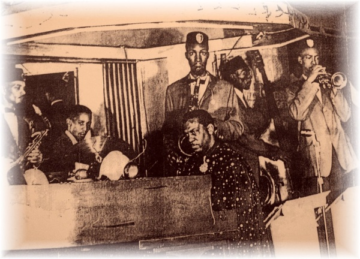by Dick Edelstein

Namwali Serpell’s article in the New York Review of Books about the life of Sun Ra was aggregated here in 3 Quarks Daily in July 2020. It was a real treat to read it, and it led me to a chain of memories about Sun Ra and his Solar Arkestra. In the early 1970s, on a visit to Seattle, where I had gone to high school and lived during my early adult years, a spacey hippie girl I barely knew stopped me on the street and presented me with a copy of The Heliocentric Worlds of Sun Ra, saying that I was just the person who would appreciate it. She was right. I was thrilled to make the acquaintance of Sun Ra and his Arkestra and of ESP Records, the small, cultish record company that had produced the LP. Later, in the mid-1970s, I crossed the Bay Bridge from Oakland to see Sun Ra’s band live at Minnie’s, a small San Francisco club on Fillmore Street, where the bandleader managed to pack in his entire Arkestra along with five or six dancers.
Sun Ra was a bandleader, composer, arranger and keyboard player who led an ensemble of crack musicians called the Solar Arkestra that played avant-garde jazz with great verve and precision. Their performances often featured dancers, chants and movement, and hip arrangements of jazz standards as well as theatrical pieces by Sun Ra based on his own philosophy, which was weird. He claimed that he had had a visionary experience which had a major quasi-religious influence on him and led to a lot of mumbo-jumbo about outer space.
You never knew what the Sun Ra Arkestra were going to play from their extensive and highly varied repertoire. They were masters of several entirely different styles, any of which might appear at any time. Even though I had been a fan of electronic music from an early age and had experimented with the early Buchla and other synthesizers, and even though Sun Ra was adept at synthesizer keyboard work, playing in his own highly original style, I listened patiently to his spacey keyboard numbers while eagerly anticipating the excitement I would feel when he regaled us with one of his ultra-hip arrangements of jazz standards that the band played with taut precision, usually in a post-bop style.
It was hard not to notice that Sun Ra’s bizarre mythology could easily be related to poignant observations about racial conditions in the US. Awareness of his garbled implicit message transcended race since his mythology was conveyed partly through the universal language of music. And floating right in the middle, The Big Doubt, an ambiguity unresolved to this day: was this guy a fiendishly clever joker slipping in a lucid message wrapped up in a cloud of mumbo-jumbo or did he really believe the things he was saying? As it does today, it seemed a moot point.
In referring to Sun Ra we need to use the word genius because there is something creepy and terribly unfair about denying him this status when, for example, Ellington’s genius is justly and universally acclaimed. Ellington excelled at commanding the loyalty of top musicians insofar as this was possible, but The Duke had to have envied Sun Ra’s unparalleled achievement in keeping together for such a long time his own outstanding collection of exceptionally talented musicians, including a horn section featuring a trio of brilliant sax players: Pat Patrick, John Gilmore and Marshall Allen. But it hurts to think of the suffering that Ellington endured upholding his saintly image while bearing the weight of well-meaning white liberal opinion and the growing aspirations of the Black population. Sun Ra managed to think outside the box to find a personal response to this awful conundrum using mythological and musical terms that can be roughly translated as: “Fuck that.”
The Arkestra continued to tour after Sun Ra’s death. In the 1990s I managed to catch them in Berkeley at a small performance space called La Peña. I was gratified to see how the Arkestra immediately drew in the young audience and then totally blew them away, but later I was disappointed to learn that most of the audience hadn’t previous heard of the band. Several years later, the Arkestra appeared in Barcelona, this time mostly featuring frenetic alto sax solos by leader Marshal Allen, but I didn’t appreciate his camp gestures that seemed to constantly mock the loopiness of the departed Sun Ra. Fair enough, but I would have liked to have seen greater respect shown.
For me, Sun Ra had had the last word on some of the controversies he stirred up when the Arkestra played at Zellerbach Hall on the Berkeley campus of the University of California in the late seventies, managing once again to catch off balance an audience that had learned to expect the unexpected. No dancers. No crazy talk. No synthesizers. No extended gestural chant numbers. The band played, one after another, a series of tunes from a catalog of jazz classics, prominently featuring Coleman Hawkins tunes and Fletcher Henderson arrangements. An encyclopedic performance covering a couple of decades of jazz played by the orchestra best equipped to do it. Take that.
